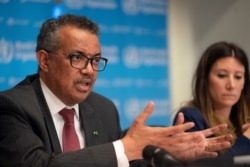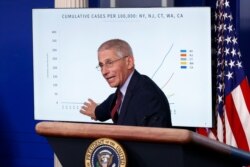U.N. Secretary-General Antonio Guterres says the coronavirus pandemic is the most challenging global crisis since World War II.
"It is a combination, on one hand, of a disease that represents a threat to everybody in the world and, second, because it has an economic impact that will bring a recession that probably has no parallel in the recent past,” he said at a virtual news conference late Tuesday.
He called for the world’s wealthier nations to expand the lending capacity of the International Monetary Fund to assist poorer countries as they confront the spread of the virus.
Guterres acknowledged that developed countries like the United States were facing grave concerns in dealing with the virus.
But he said, “Let us remember that we are only as strong as the weakest health system in our interconnected world.” He warned that if the coronavirus was left unchecked in the developing world, it would soon spread again across the globe.
Later, a major change
He said that when the crisis ends, the global socioeconomic order needs to change.
“Everything we do during and after this crisis must be with a strong focus on building more equal, inclusive and sustainable economies and societies that are more resilient in the face of pandemics, climate change and the many other global challenges we face,” he said.
World Health Organization Director-General Tedros Adhanom Ghebreyesus said Wednesday that he was “deeply concerned about the rapid escalation and global spread of infection.”
He said there had been “near exponential growth” in the pandemic in the last five weeks. Tedros said the number of deaths had more than doubled in the past week, and he predicted that the number of confirmed cases soon would reach 1 million and the death toll would hit 50,000.
Italy, with the world’s highest coronavirus toll, reported an additional 727 deaths Wednesday, although the rate of deaths slowed. Its overall toll was at 13,155.
Spain announced that it had surpassed 100,000 confirmed coronavirus cases and 9,000 deaths. One of the world's coronavirus hot spots, Spain trails only the United States and Italy in terms of the number of cases.
Advice to pilgrims
A senior Saudi official urged people planning to make the hajj pilgrimage to hold off on deciding for now.
Muslim pilgrims are due to descend on Saudi Arabia from all over the world in late July to perform the once-in-a-lifetime religious duty. But with the virus pandemic, and Saudi Arabia already banning entry to Mecca and Medina, Saudi Hajj and Umrah Minister Muhammad Saleh bin Taher Banten told state television that people should wait for more clarity on the situation.
In the United States, officials have said Americans should be prepared for a potential 100,000 to 240,000 deaths from the coronavirus, while stressing the need to keep social distancing measures in place to give the best chance of lessening the toll.
Dr. Anthony Fauci, director of the U.S. National Institute of Allergy and Infectious Diseases, said he hoped the number would not go that high, but that realistically people should be ready.
“People are suffering. People are dying,” he said. “It's inconvenient from a societal standpoint, from an economic standpoint, to go through this. But this is going to be the answer to our problems. So let's all pull together and make sure, as we look forward to the next 30 days, we do it with all the intensity and force that we can.”
The U.S. death toll was above 4,600 as of Wednesday afternoon, a figure increasing by the hour. The nation had more than 206,000 confirmed infections.
Lockdowns worldwide
Countries all over the world have locked down cities, regions and even their entire nations to try to stop the virus from spreading. One of the latest to put in place a two-week ban on all but essential activities was Vietnam, which started Wednesday.
Last week, New Zealand shut down restaurants, bars, offices and schools. Prime Minister Jacinda Ardern said Wednesday that it was too early to tell how much those measures had helped so far and advocated more testing to track down infections and stop new transmissions.
Her government reported 61 new cases to push New Zealand’s total to 708.
"If the virus is in the community in this way ... then the worst thing we can do is to relax and be complacent, and allow the silent spread," Ardern said.
In South Korea, where mass testing has helped level off local transmission rates, officials reported 101 new cases Wednesday. The country also started enforcing new 14-day quarantines for anyone entering the country.
The risks of imported cases undermining successes in controlling community spread of COVID-19 have prompted similar measures in China, which for several months was by far the world leader in coronavirus cases but now has become a sign of hope with a gradual lifting of lockdown restrictions.
German health officials reported about 5,500 new cases, putting the country on track to soon become the next to surpass China.
Meanwhile, in keeping with a plea from U.N. chief Guterres for parties in the world’s conflicts to take this opportunity to halt their fighting, the U.N. Security Council on Tuesday urged Afghanistan’s warring sides to implement a cease-fire.
The council "called on the political leadership of Afghanistan to put aside their differences and put the interest of the country first."








